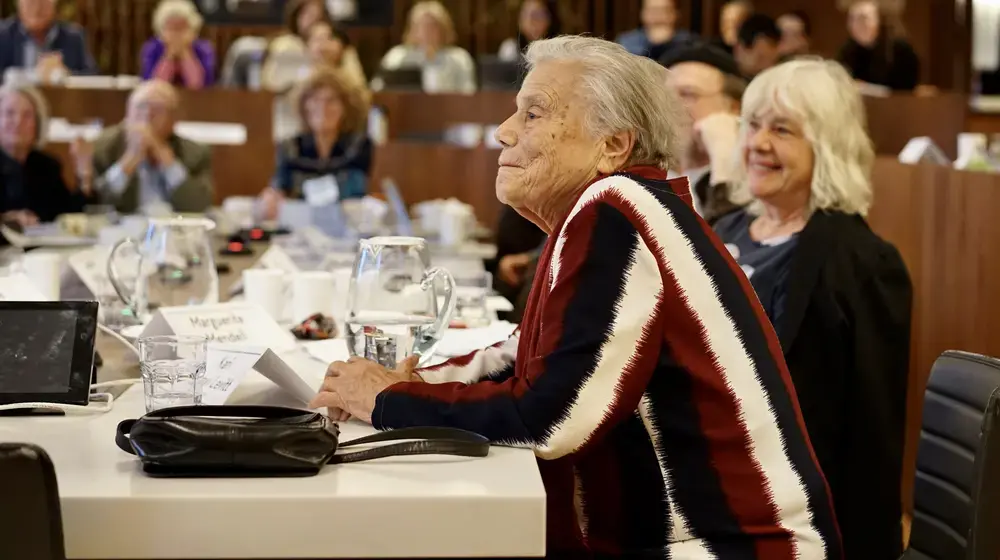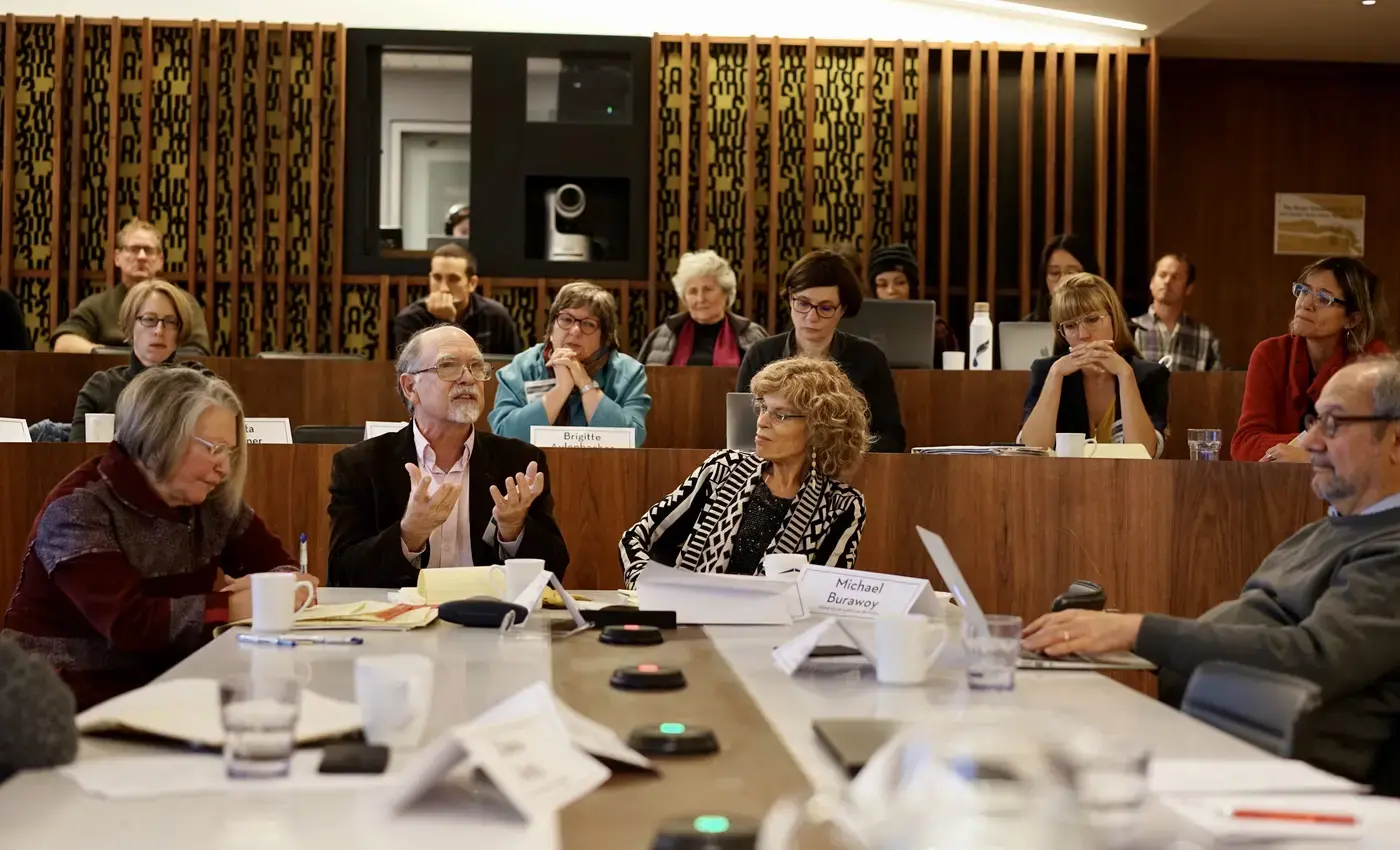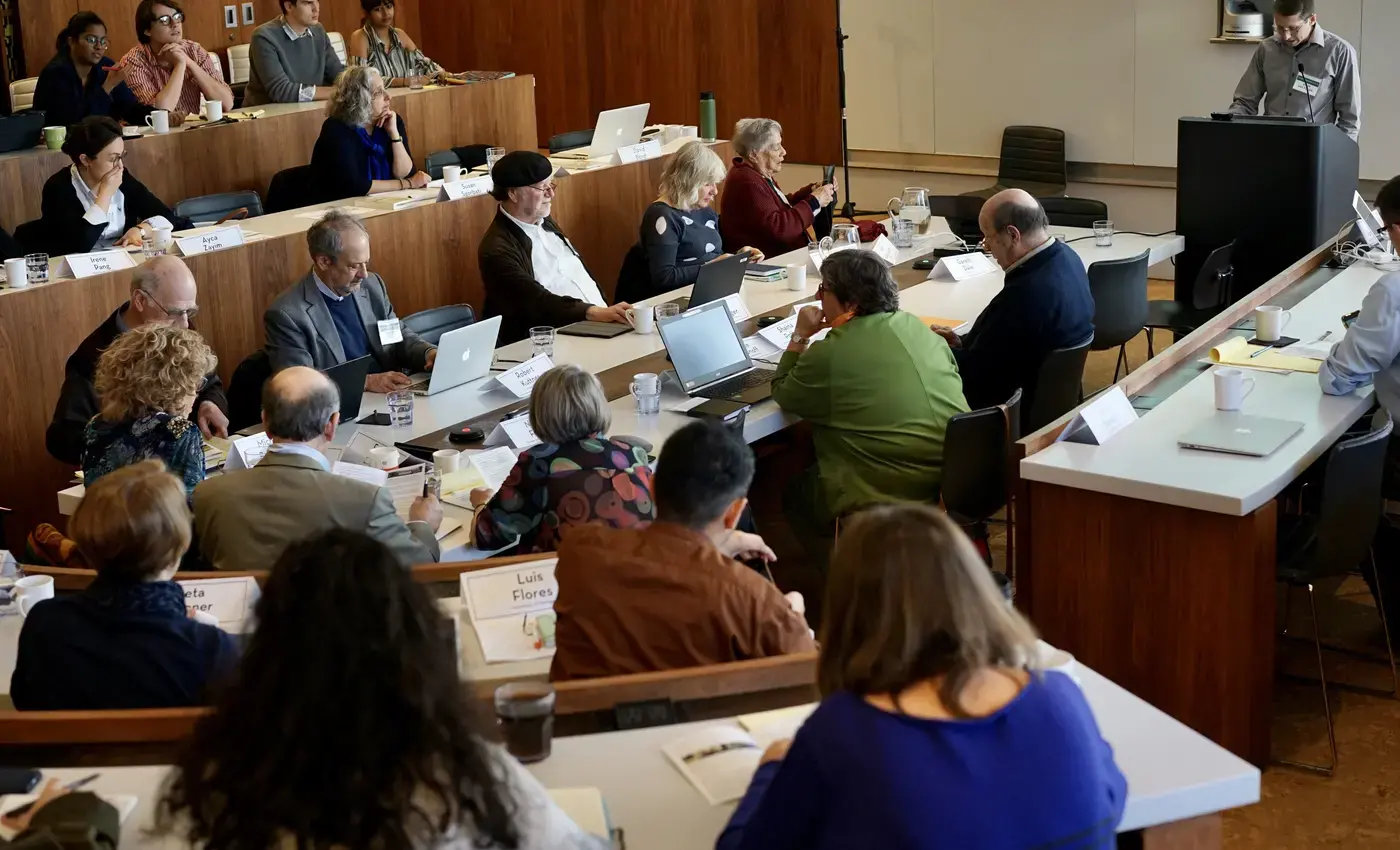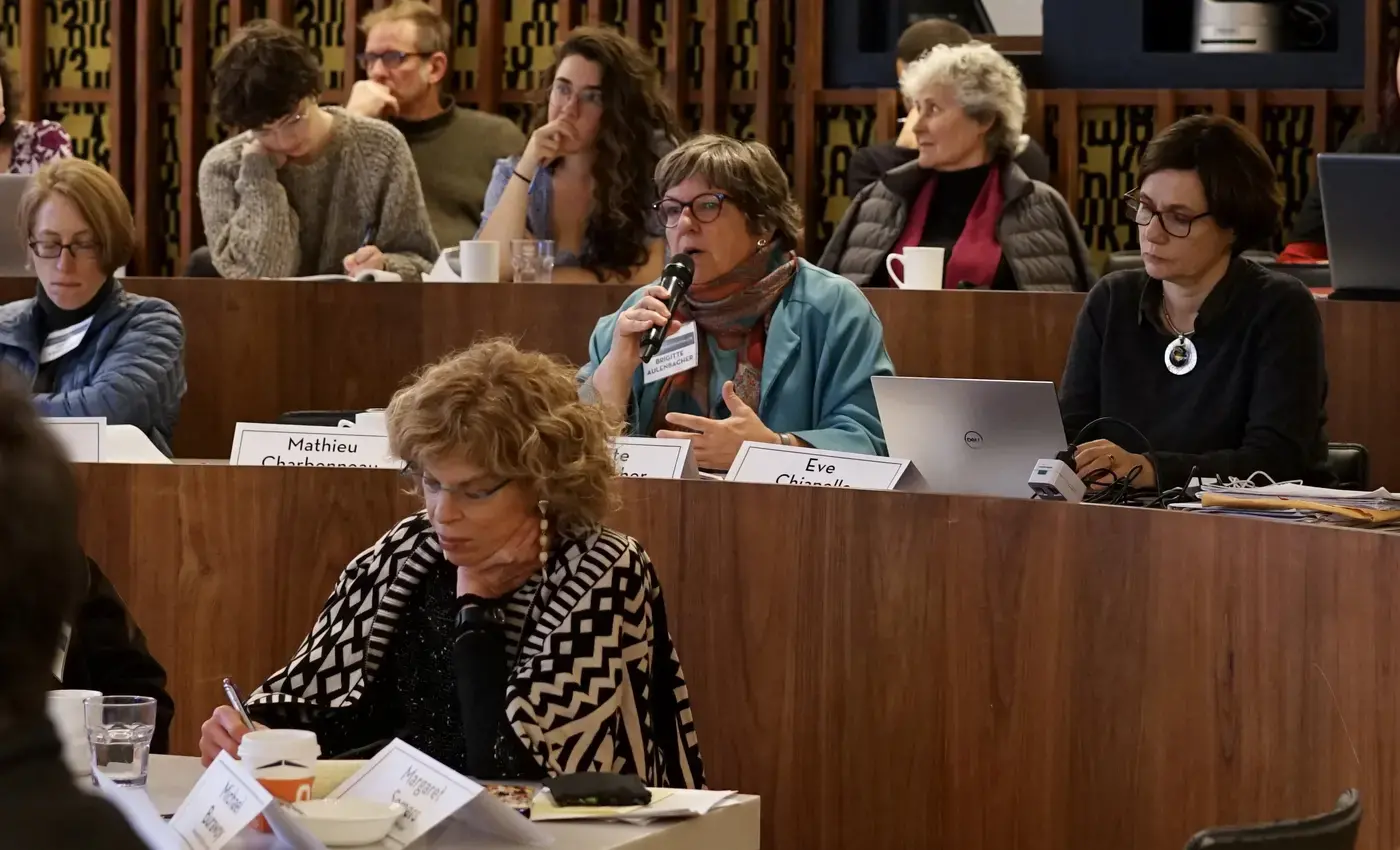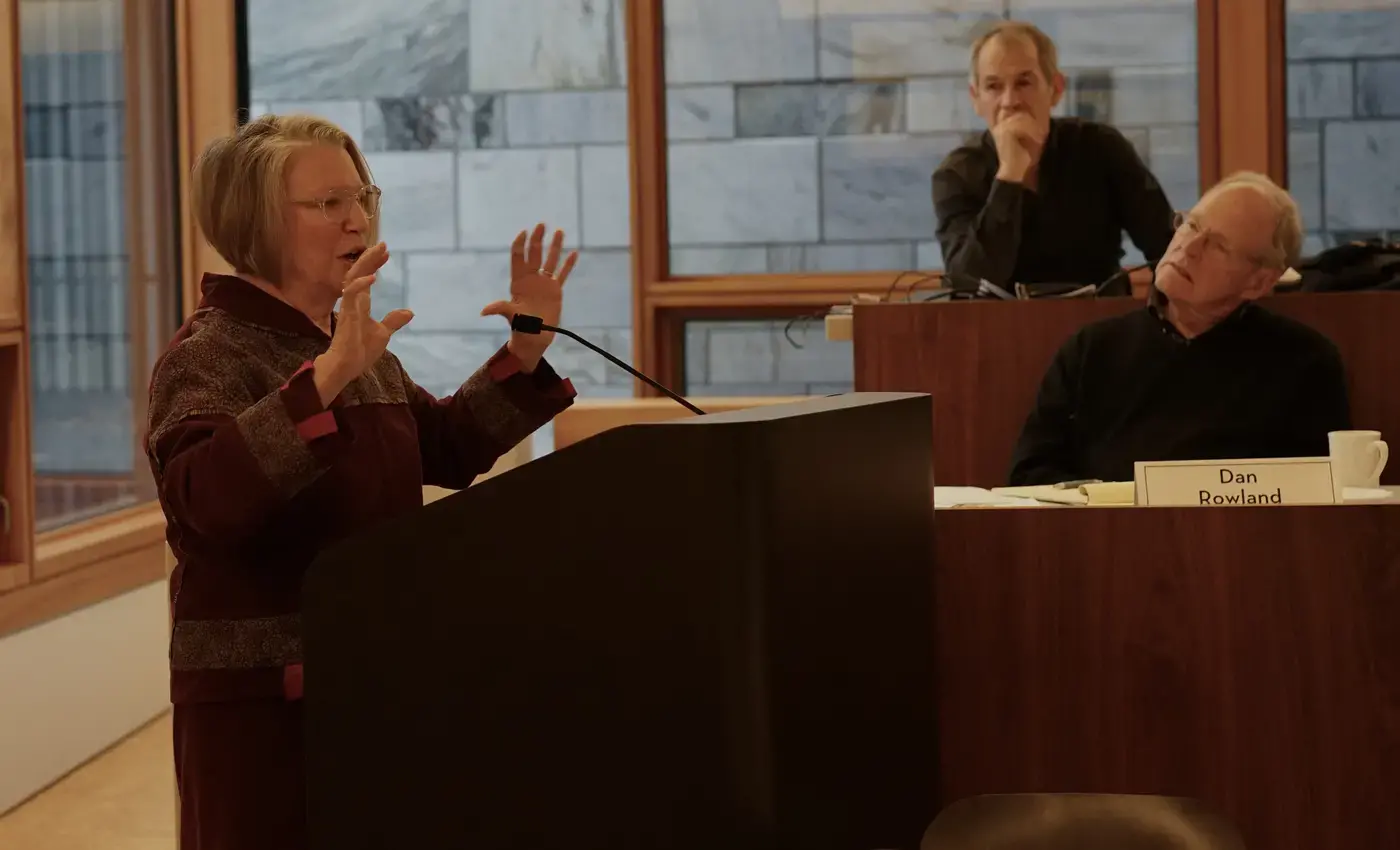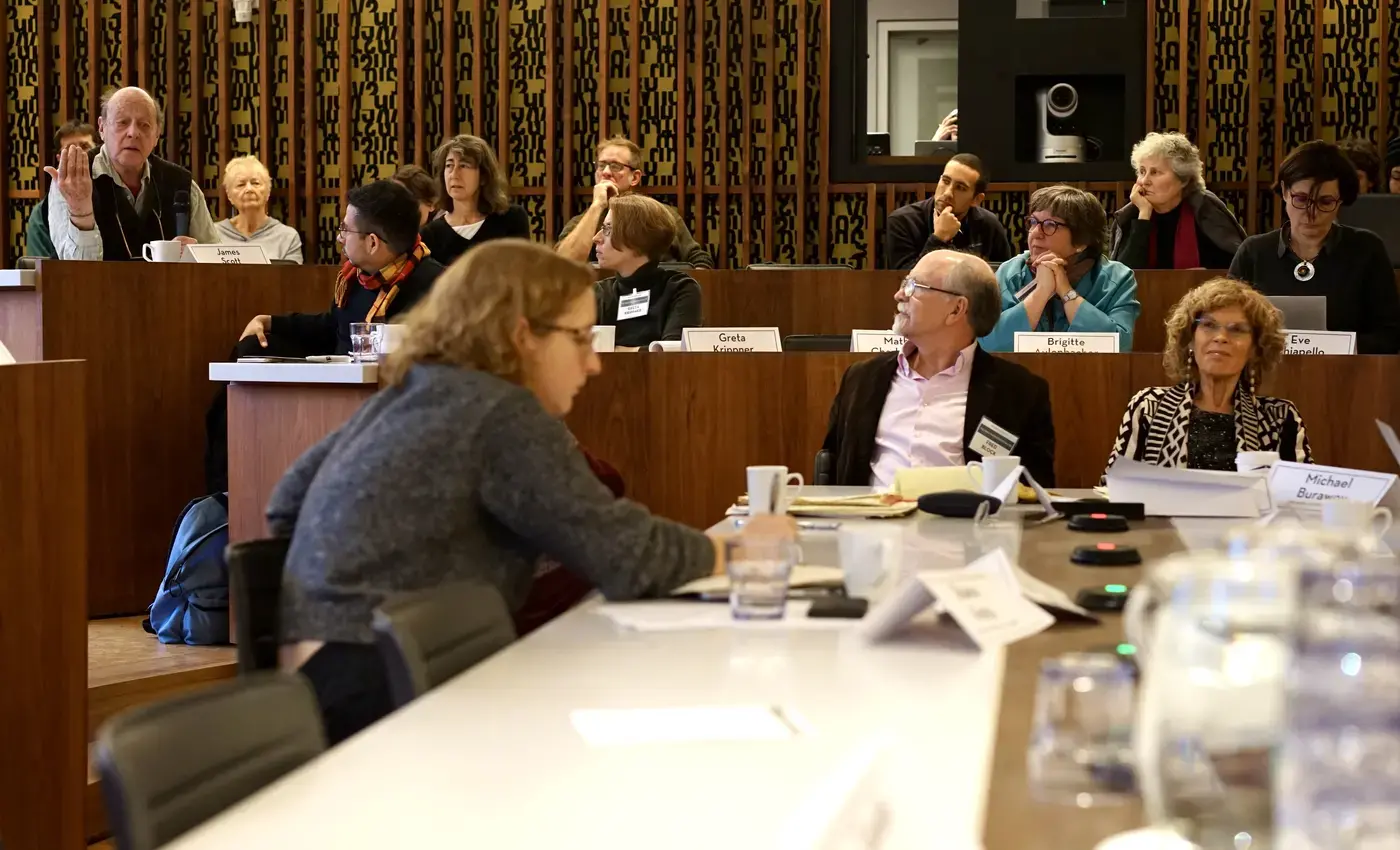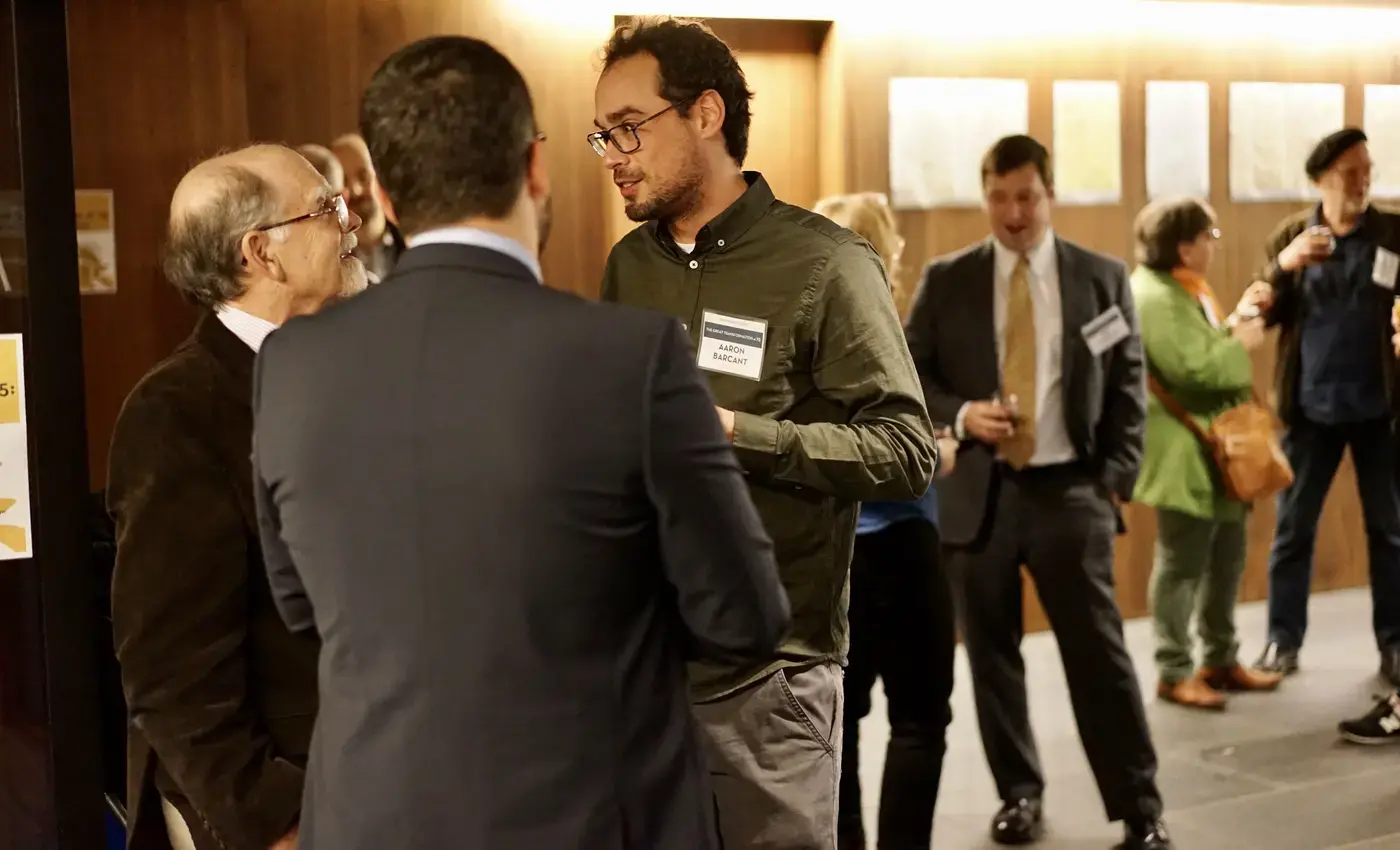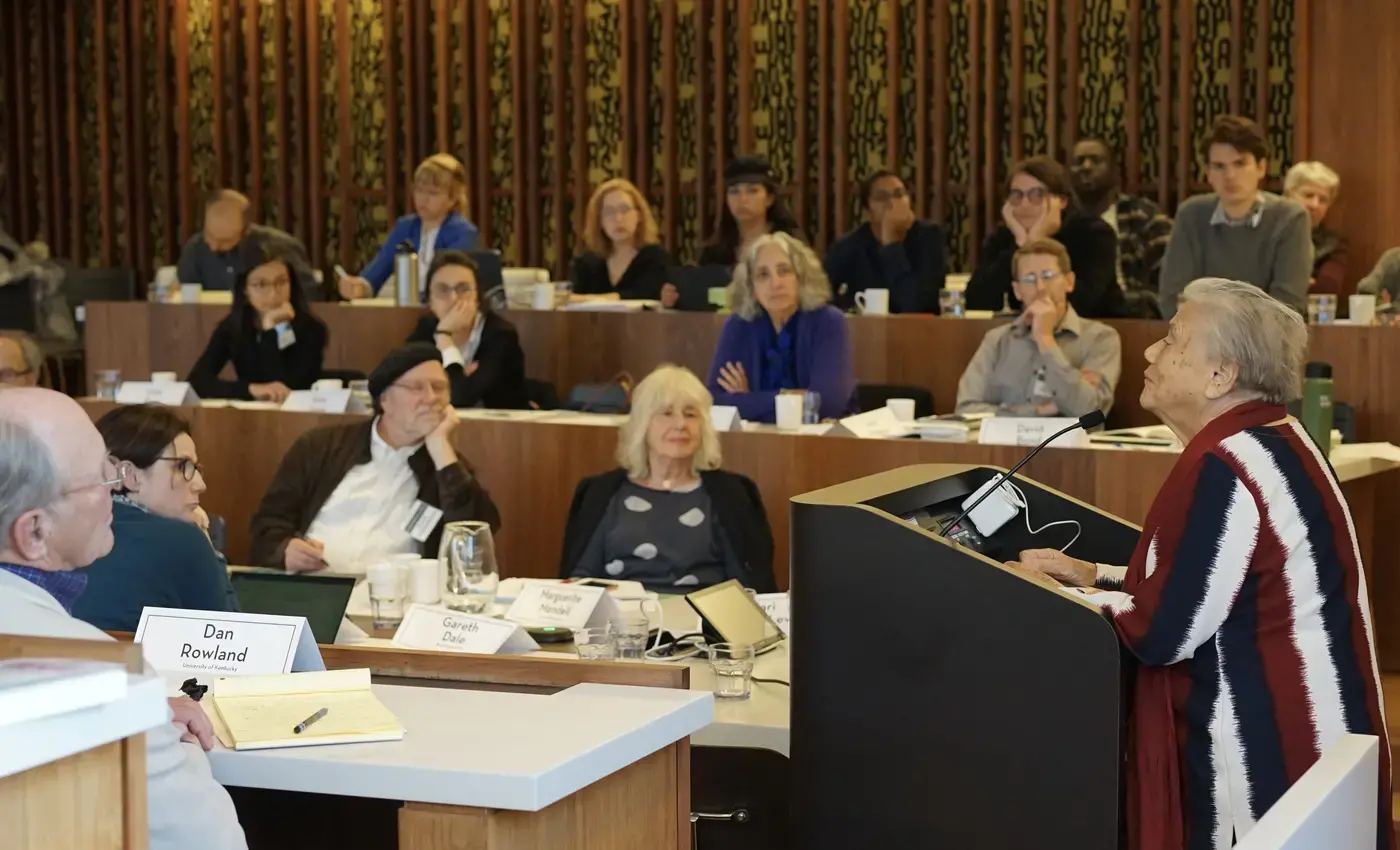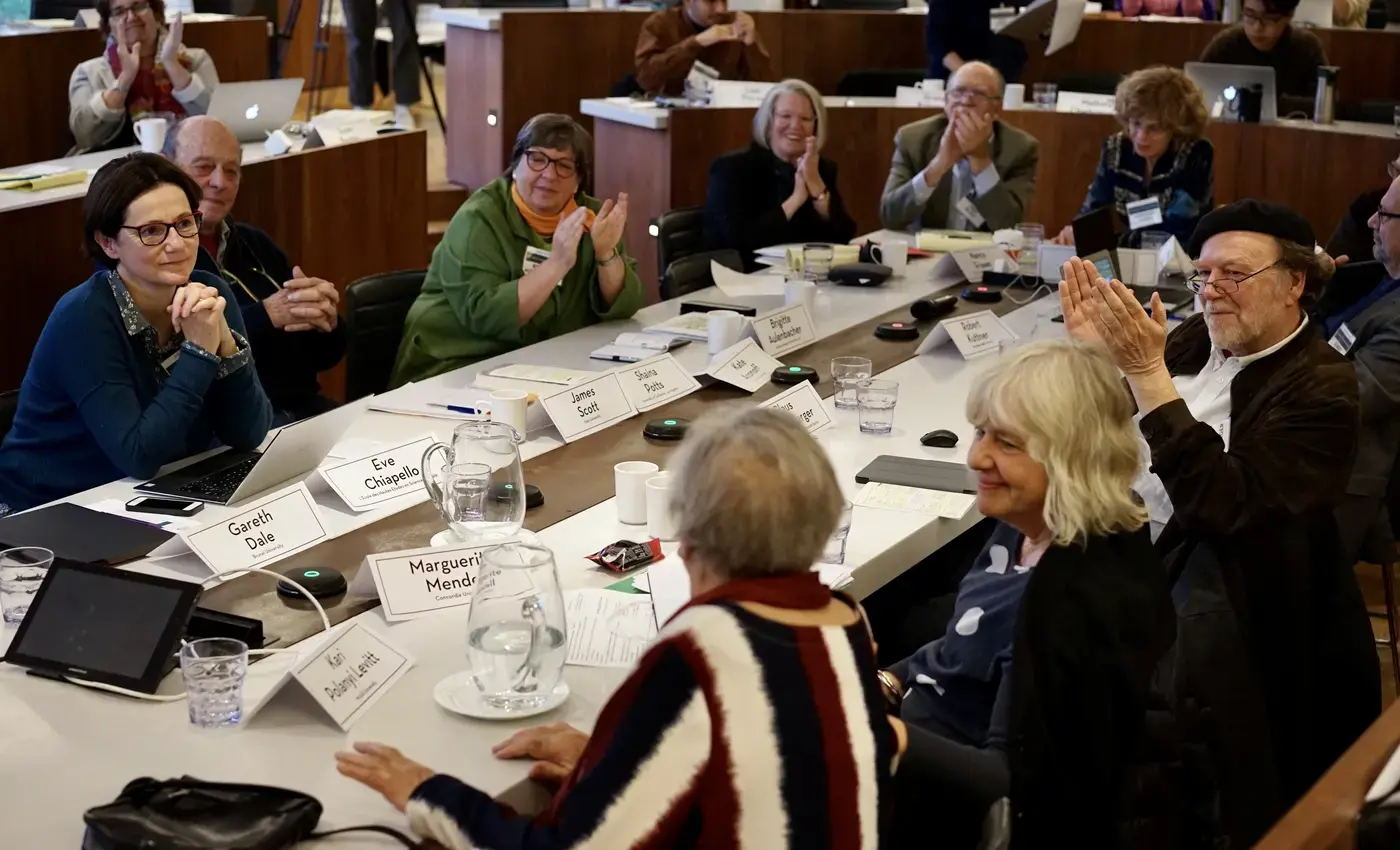The Great Transformation at 75
Center for the Advancement of Public Action
Bennington, Vermont
To mark the seventy-fifth anniversary of The Great Transformation, Bennington College convened a global group of scholars and engaged intellectuals to consider how Karl Polanyi’s intellectual legacy could help us to develop 20/20 vision—a more generative and generous analysis of the human predicament on the eve of a new decade.
Read a summary of this conference published on the International Karl Polanyi Society website >>

In 1944, Karl Polanyi penned one the twentieth century’s most incisive works of scholarship: The Great Transformation. As an émigré fleeing Nazism, Polanyi witnessed a world falling apart as global depression, fascist regimes, and resurgent racism metastasized into worldwide terror. Finding intellectual sanctuary at Bennington College, Polanyi worked out a bold diagnosis of what had gone wrong in The Great Transformation, and of how modern society might be rebuilt upon a more equitable foundation.
Watch the full interview here
Dates | Oct 25–27, 2019
Location | Bennington College, CAPA Symposium
Contact | capa@bennington.edu
Hosted by John Hultgren, David Bond, and Susan Sgorbati
SCHEDULE OF EVENTS
Friday, October 25
12:00–2:00 PM | Polanyi and Precarious Life
- Luis Flores, “Polanyi at a Tupperware Party: The Spread of Distributive Industriousness Among American Households”
- Irene Pang, “Rethinking Civil Society and Democracy: Lessons from Construction Workers in Beijing and Delhi”
- Mathieu Charbonneau, "The Concept of Fictitious Commodity and the Case of Insurance Risks"
- Aaron Barcant, "Coexistence: Karl Polanyi and Peter Drucker Navigating Mid-Century Crises"
- Discussant: Michael Burawoy
2:30–4:30 PM | Liberal Institutions and the Global Market
- Shaina Potts, “The Politics of the 'Private': Liberal Legal Dichotomies and Global Markets”
- Ayca Zayim, “The Polanyian Countermovement and Central Banks in the Contemporary Global Financial System”
- Jay Varellas, "Constitutional Political Economy in the Age of Financialization"
- Discussant: Gareth Dale
7:30–9:00 PM | Opening Reception: Remarks by John Hultgren, David Bond, and Kari Polanyi Levitt (Commons Atrium)
Saturday, October 26
9:00–9:30 AM | Welcome/Introduction: Isabel Roche, Interim President of Bennington College, and Fred Block)
9:30–11:30 AM | First Plenary: The Predicament and Promise of Democracy Today
- Fred Block, “Origins of the Crisis of Our Time”
- Robert Kuttner, “Can Democracy Survive Global Capitalism?”
- Marguerite Mendell, "Instituted Processes of Democratization: Imagining a Conversation between Karl Polanyi and Roberto Mangabeira Unger"
- Discussant: James Scott
11:30 AM–1:00 PM | Lunch (Commons Dining Hall)
1:00–3:00 PM | Second Plenary: Global Market Fundamentalism and its Discontents
- Brigitte Aulenbacher, “Care, Capitalism, and the Dynamics of the 'Market Society' and the 'Machine Age'"
- Claus Thomasberger, “The Challenges of a Technological Civilization: Economic Liberalism and Polanyi's Vision of the Great Transformation”
- Margaret Somers, "Diagnosing Fascism, Capitalism, and the Moral Crimes of Market Justice: Polanyi's Socialist Vision of a Predistributive Democracy"
3:30–5:30 PM | Third Plenary: Financialization and the Paradoxes of Late Capitalism
- Kari Polanyi-Levitt, “The Return of Karl Polanyi: From the Bennington Lectures to our Present Age of Existential Crises'"
- Eve Chiapello, "Financialization and Fictitious Commodities"
- Michael Burawoy, "Going Public with Polanyi in the Era of Trump"
- Discussant: Greta Krippner
7:30–9:00 PM | Public Concert (Deane Carriage Barn)
Sunday, October 27
8:30–10:30 AM | Fourth Plenary: The Climate Crisis
- Kate Aronoff, “Market Failure, Market Solution: How Neoliberalism Gets the Climate Crisis Wrong”
- Gareth Dale, “Marx, Polanyi, and the Green New Deal”
- Andreas Novy, "The Spatiality of the Current Transformation: Lessons from The Great Transformation"
- Discussant: Nancy Fraser
11:00 AM–1:00 PM | Closing Plenary: Polanyi and Politics Today—Reform or Revolution?
Participants
Kate Aronoff | Writer/Journalist, Climate and American Politics | In These Times, The Intercept
Brigitte Aulenbacher | Professor, Sociological Theory and Social Analysis | Johannes Kepler University, Linz
Fred Block | Professor, Sociology | University of California, Davis
Michael Burawoy | Professor, Sociology | University of California, Berkeley
Mathieu Charbonneau | Post-Doctoral Fellow | Karl Polanyi Institute
Eve Chiapello | Professor, Economic Sociology and History of Criticism | L'Ecole des Hautes Etudes en Sciences Sociales
Gareth Dale | Senior Lecturer, Social and Political Science | Brunel University London
Luis Flores | Ph.D. Candidate, Sociology | University of Michigan
Nancy Fraser | Henry and Louise A. Loeb Professor, Philosophy and Politics | The New School for Social Research
Greta Krippner | Associate Professor and Associate Chair, Sociology | University of Michigan
Robert Kuttner | Co-Founder and Co-Editor | The American Prospect; Professor, Public Policy | Brandeis Heller School
Marguerite Mendell | Professor, School of Community and Public Affairs | Concordia University
Andreas Novy | Associate Professor, Institute for Multilevel Governance | Vienna University of Economics and Business
Irene Pang | Assistant Professor, International Studies | Simon Fraser University
Kari Polanyi-Levitt | Professor Emerita, Political Economy | McGill University, Montreal
Shaina Potts | Assistant Professor, Geography | University of California, Los Angeles
James Scott | Sterling Professor of Political Science, Professor of Anthropology | Yale University
Margaret Somers | Professor Emerita, Sociology | University of Michigan
Claus Thomasberger | Professor, Economics, International Relations | Hochschule für Technik und Wirtschaft Berlin
Jay Varellas | Ph.D. Candidate, Political Science | University of California, Berkeley
Ayca Zayim | Assistant Professor, Sociology | Mt. Holyoke College
Bennington Food and Attractions
Food/Restaurants near Bennington College
On campus
- Dining Hall (in Commons): breakfast, lunch, and dinner (8am-7pm)
- Roz’s Café (in Commons downstairs): coffee (including espresso) and pastries (7am-2pm); bring your own mug!
North Bennington (15 minute walk from the college; map below)
- Pangaea: solid food, good beer list, and nice ambiance (5 – 11 pm)
1 Prospect Street, North Bennington - Kevin’s Sports Pub: Burgers and Beer (kitchen open until 10pm on weekdays/11 on weekends
27 Main Street, North Bennington - Marigold Pizza: farm to table pizza (4pm-10pm)
25 Main Street, North Bennington - Powers Market: Classic Vermont general store, serving coffee and sandwiches.
9 Main Street, North Bennington
Bennington (10 minute drive)
- Allegro Ristorante: Italian fine dining with extensive wine list (5-10pm)
520 Main Street, Bennington - Bakkerij Krijnen: excellent Dutch bakery (9am-3pm)
1001 Main Street, Bennington - The Blue Benn: classic railcar diner with extensive breakfast menu (6am-5pm)
314 North Street, Bennington - Harvest Brewing: Nano Brewery and coffee shop
201 South Street, Bennington - The Loose Cannon Cafe: coffeehouse with array of sandwiches
139 Main Street, Bennington
Hoosick Falls (15 minute drive)
- Brown’s Brewing: beer and pub fare in renovated factory with generous seating and views of Walloomsac River (noon-9pm)
50 Factory Hill Road, Hoosick Falls, NY (tricky entrance; turn right after bridge then follow down hill and under bridge) - Iron Coffee: excellent coffee and espresso, with breakfast sandwiches and pastries. (6:30am-6pm)
9 Main Street, Hoosick Falls, NY
Activities On and Around Campus
Music: Essential Prayers Project (CAPA Lens, Friday, 9:30 P.M.)
An a cappella look at what prayers communicate between people, across time, space and creed. 6 singers in the Lens. Kitty Brazelton, composer. Michael Chinworth ('08), music director.
Drama Production: “Everybody” by Brandon Jacobs-Jenkins. (VAPA Lester Martin Theatre, Fri-Sun, 8:00-9:30)
Everybody is summoned by God to make account of their life before passing into the unknown afterlife. Everybody solicits Friendship, Kinship, and Worldly Goods to accompany them, only to discover, "you can't take it with you."
Robert Frost Stone House Museum: celebrates Frost’s poetry and life in Shaftsbury, VT. (10am-4pm; $10 admission/$6 seniors and students)
The Blue Trail: several mile-long trail system that goes through the woods around campus. You can hop on near the basketball courts and can link up with the Frost Trail. Watch for ticks!
Hiking/Outdoors
Mile Around Woods: Network of walking trails that cross rolling hills and hayfields with views of Green Mountains
Parking and entrance on West Street, North Bennington (first entrance leads to wooded trails; second entrance leads across fields)
Local Cultural Attractions
Bennington Museum: home to the largest collection of Grandma Moses paintings in the world.
Mass MoCA: contemporary art museum 30 minutes south in North Adams, MA.
The Clark: art museum in Williamstown, MA.
Who is Karl Polanyi?
Karl Polanyi (1886-1964) was an Austro-Hungarian thinker whose work provided a path-breaking analysis of the origins and evolution of market societies. His approach to understanding the relationship between politics and the economy has proven influential in the development of numerous fields of study, including economic history, economic sociology, economic anthropology, and historical sociology. In addition to The Great Transformation (1944), he co-published the influential edited volume, Trade and Market in Early Empires (1957). Polanyi served as editor of Der Österreichische Volkswirt (“the Austrian Economist”), and taught at the Workers’ Education Association, Bennington College, and Columbia University.
Today, Polanyi's powerful analytic framework and political project are more relevant than ever. The past decade has seen the rise of fiercely anti-democratic forces, the forced displacement of millions of people, proliferating threats of spectacular and intimate violence, troubled national and global economies marked by growing inequality, explosions of parochial hatred and insurgent racism, and a deepening planetary crisis as the uneven impact of climate change intensifies. The Great Transformation—both in the stunning clarity of its vision and in the sweeping scale of its synthesis—offers an instructive model of the kind of scholarship so urgently needed today: scholarship that can confront the cascading fractures and synergies that enliven human inequity and endanger our world, and also chart ways past them.
Why Bennington College?
In July 1940, the President of Bennington College, Robert Leigh, wrote to the publisher W.W. Norton, asking him to forward the names of refugee scholars who had been forced to leave Europe, and who might benefit from spending a year at Bennington as “honorary fellows of the college.” Later that week, the organizational theorist Peter Drucker, himself a refugee, contacted Leigh with a request to bring a little-known scholar from Vienna to the college. Karl Polanyi arrived at Bennington in early Fall 1940 for a short-term lectureship, which was subsequently extended with support from the Rockefeller Foundation, allowing him to remain until 1943. While in residence, Polanyi gave a series of public lectures that offered a bold new interpretation of what had gone wrong as the world fell into unprecedented turmoil. Soon Polanyi was hard at work transforming these early thoughts into what became his magnum opus, The Great Transformation: The Political and Economic Origins of Our Time. As the war and the manuscript both neared completion in 1944, Polanyi left the final revisions in the hands of colleagues at Bennington College as he rushed back to Europe to put his stunning synthesis to work rebuilding the world.
Read more about Polanyi's time at Bennington here.
the Rosa Luxemburg Foundation,
the Ruth D. Ewing ’37 Lecture Series, and
Bennington College
